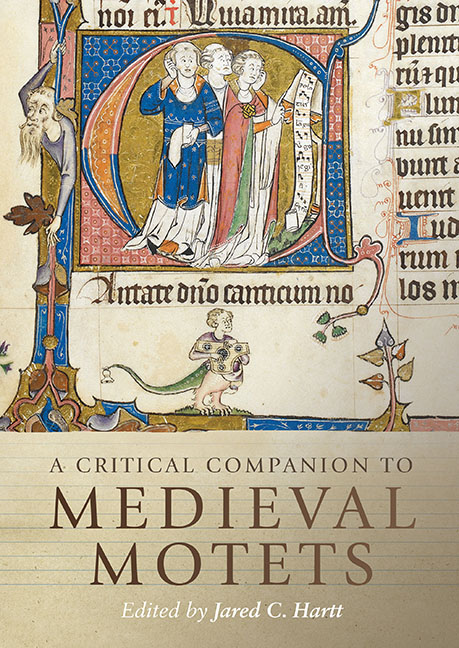Book contents
- Frontmatter
- Dedication
- Contents
- List of Figures
- List of Music Examples
- List of Tables
- List of Contributors
- Preface
- Acknowledgments
- Abbreviations
- Introduction: Approaching Medieval Motets
- 1 The Genre(s) of Medieval Motets
- 2 Origins and Interactions: Clausula, Motet, Conductus
- 3 Tracing the Tenor in Medieval Motets
- 4 Isorhythm
- 5 Notation
- 6 Thirteenth-Century Motet Functions: Views through the Lens of the Portare Motet Family
- 7 A Prism of its Time: Social Functions of the Motet in Fourteenth-Century France
- 8 Motets, Manuscript Culture, Mise-en-page
- 9 Clerics, Courtiers, and the Vernacular Two-Voice Motet: The Case of Fines amouretes / Fiat and the Roman de la poire
- 10 When Words Converge and Meanings Diverge: Counterexamples to Polytextuality in the Thirteenth-Century Mote
- 11 Motets in Chansonniers and the Other Culture of the French Thirteenth-Century Motet
- 12 Building a Motet around Quoted Material: Textual and Musical Structure in Motets Based on Monophonic Songs
- 13 The Duet Motet in England: Genre, Tonal Coherence, Reconstruction
- 14 Materia Matters: Reconstructing Colla/Bona
- 15 Machaut’s Motet 10 and its Interconnections
- 16 A Motet Conceived in Troubled Times: Machaut’s Motet 22
- 17 A Motet Ahead of its Time? The Curious Case of Portio nature/Ida capillorum
- Bibliography of Works Cited
- Select Glossary
- Index of Cited Motets
- General Index
- Studies in Medieval and Renaissance Music
- Frontmatter
- Dedication
- Contents
- List of Figures
- List of Music Examples
- List of Tables
- List of Contributors
- Preface
- Acknowledgments
- Abbreviations
- Introduction: Approaching Medieval Motets
- 1 The Genre(s) of Medieval Motets
- 2 Origins and Interactions: Clausula, Motet, Conductus
- 3 Tracing the Tenor in Medieval Motets
- 4 Isorhythm
- 5 Notation
- 6 Thirteenth-Century Motet Functions: Views through the Lens of the Portare Motet Family
- 7 A Prism of its Time: Social Functions of the Motet in Fourteenth-Century France
- 8 Motets, Manuscript Culture, Mise-en-page
- 9 Clerics, Courtiers, and the Vernacular Two-Voice Motet: The Case of Fines amouretes / Fiat and the Roman de la poire
- 10 When Words Converge and Meanings Diverge: Counterexamples to Polytextuality in the Thirteenth-Century Mote
- 11 Motets in Chansonniers and the Other Culture of the French Thirteenth-Century Motet
- 12 Building a Motet around Quoted Material: Textual and Musical Structure in Motets Based on Monophonic Songs
- 13 The Duet Motet in England: Genre, Tonal Coherence, Reconstruction
- 14 Materia Matters: Reconstructing Colla/Bona
- 15 Machaut’s Motet 10 and its Interconnections
- 16 A Motet Conceived in Troubled Times: Machaut’s Motet 22
- 17 A Motet Ahead of its Time? The Curious Case of Portio nature/Ida capillorum
- Bibliography of Works Cited
- Select Glossary
- Index of Cited Motets
- General Index
- Studies in Medieval and Renaissance Music
Summary
Music, like many art forms, underwent numerous changes and developments in the medieval period. In the thirteenth and fourteenth centuries in particular, a genre of music – motets – emerged as a dominant vehicle for composers. In fact, many scholars would consider motets to constitute the most important genre of polyphony: that is, instead of penning a stand-alone melody (monophony), composers would write and/or arrange two or more melodies to be performed simultaneously (polyphony). Moreover, medieval motets are intrinsically involved in the early development of polyphonic music, especially in regards to the development of rhythm and its notation; the study of motets throughout the two centuries in question reveals a fascinating evolution of polyphonic experimentation and mastery.
Yet, it is nearly impossible to come up with a precise definition for the genre of medieval motets. Briefly put, beginning in the early 1200s, motets provided an outlet for composers to set poetry to music, but, intriguingly, composers often set two or more different poems to be sung at the same time. Frequently, these simultaneous poems would be sung against yet another melody, the tenor, which was almost always textless and in a lower register than the texted voices, and which was usually borrowed, sometimes from a chant source, sometimes from a vernacular popular tune. This description does not account for all medieval motets – for instance, there is a significant body of surviving monophonic motets – but it does sum up a good deal of the extant repertory.
The subject matter of motets varies widely. Some motets feature vernacular French poems that employ the conventional tropes of ‘courtly love’. These texts might be sung against a tenor of liturgical origin, thus inviting the listener and/or reader to draw connections between the meanings of the tenor source and the poetry. Other motets serve an admonitory function, perhaps warning or counselling a king about inappropriate behaviours, or perhaps lamenting the current political climate. Still others celebrate a particular feast day or a specific person or place. Latin texts were likewise common, and sometimes composers would even set concurrent French and Latin poems.
But why would a composer set two or even three different poems to be sung at the same time? How is the listener supposed to understand the text? Gleaning meaning from motets has resulted in abundant scholarship and differing viewpoints.
- Type
- Chapter
- Information
- A Critical Companion to Medieval Motets , pp. xv - xviPublisher: Boydell & BrewerPrint publication year: 2018

